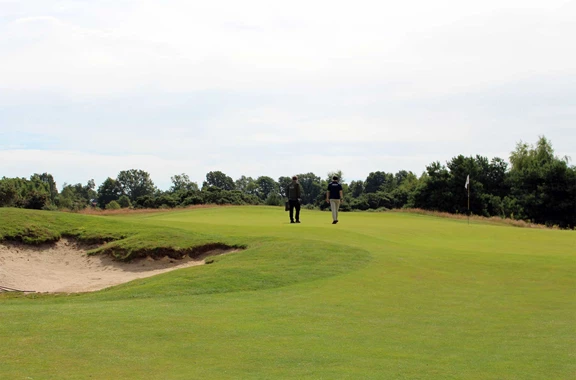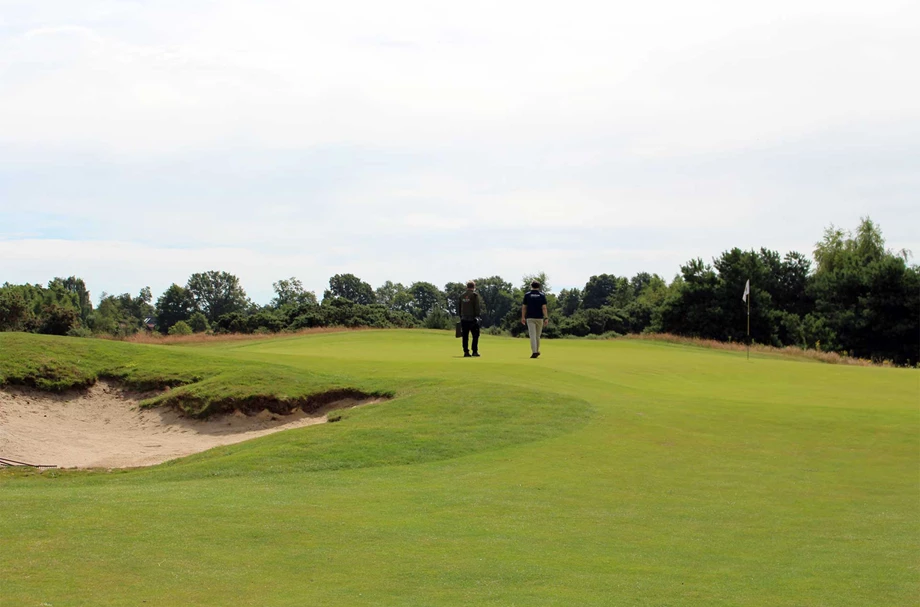


A healthy plant starts with a healthy soil, and that also applies to grass. That is why more and more experiments are being done on the golf course with natural maintenance methods, sometimes supplemented with compost tea. Lee Lennox, Head Greenkeeper at de Enk Groen & Golf, is convinced that an organic approach to golf course maintenance is much better than the chemical one. At the Stippelberg golf course he uses compost tea to measure its effects.
“I used a lot of synthetic agents, because I thought that would keep me in control of the plant health. Until one year I decided to keep the grass growth as minimal as possible. This was very difficult to achieve with chemical agents. So I decided to switch to organic.”
Lennox recounts how he began to notice the benefits of organic fertilisers. "Plants were taking longer to wilt. They were staying greener longer with lower moisture levels, so I thought, something good was happening here. I started cutting out more and more: sulphates, salt fertilisers. The grass grew slower, but it was a healthier plant and that was what I wanted.”
The innovative greenkeeper had already been experimenting with compost tea as a supplement to his natural maintenance methods. He was named Greenkeeper of the Year in 2023 and was given the opportunity to apply his organic method at the Stippelberg Golf course. He combines organic fertilizers with compost tea on the greens and the results show that his method works. He came in touch with Royal Eijkelkamp through a colleague. The large brewing machine that Royal Eijkelkamp supplies, with ready-to-use brewing kits and nutrient mixes that have been tested for composition, make the work a lot easier for Lee Lennox.
You don't have to spend thousands of dollars on fertilisers to maintain a healthy golf course

To test the effects of his treatments, also in combination with the compost tea, Lee regularly takes soil samples and takes photos of the roots. Root lengths of over 20 centimeters are no longer an exception. In addition, he measures, among other things, soil moisture, the Clegg, or how the ball bounces on the court, the amount of grass cuttings, and how quickly the green recovers, for example at the places where he takes his samples.
The column of soil he brings up is studied extensively: for the smell, the soil structure, the length of the roots and even the organisms he can see with the naked eye. But it's the invisible organisms that call the shots. The soil biology determines how healthy the soil is and how many nutrients the plant has access to. Compost tea has been specially developed to supplement and feed those organisms.
“If you have soil biology on your side to combat pathogenic fungi and turf pests, for example, it actually does the work for you, and is much better at it! With good soil biology, you need fewer chemicals.” And that is valuable, because those chemicals can also have negative environmental effects.
Lee hopes to raise more awareness of natural golf course management. "I want to change the way people think about this and show that it works, so that they’ll use fewer and fewer chemicals. The natural way is also a lot cheaper; you really don't have to spend thousands of euros on fertiliser to maintain a healthy golf course.”
Many greenkeepers find it difficult to step out of the comfort of routine: they will continue to apply chemicals as long as the grass stays green and the laws don’t change. But one day those chemicals will be banned, and then Lee will know how to keep the golf course in good condition in a different way.
“My greens are already a step ahead because there is a lot going on underground. On courses using cocktails of chemicals the grass is completely dependent on them, because it has been way for years! After years of 'fast food' and 'antibiotics', you can’t give the soil one 'apple' and think it will be healthy. That transition takes time, unlike the synthetic method that often show an immediate effect.”
This text is an abbreviated version:

Need advice for your soil health project? Our specialist Bob is happy to help.